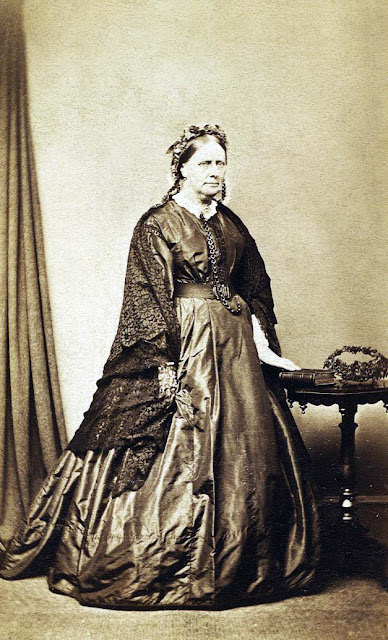In order to better understand Joseph and Lily, I think we have to understand at least a little bit of their family history. I'll start with Lilian's family.
Lilian Rachel Brown was born to Benjamin Brown and Catherine Berry Knights on 14 September, 1867 in Beccles, Suffolk, England. She had 3 older siblings, a twin sister, and 3 younger siblings. I'll talk more about them as we go on.
Benjamin Brown was born (29 December 1839) and raised in Geldeston, Norfolk, England. He was the son of Botwright Brown, Jr. and Rachel Rushmere.
 |
| Botwright Brown, Jr. & Rachel Rushmere Brown |
Ben's father, Botwright, was listed in the 1851 Geldeston,
Norfolk, England Census as a Malster Servant, meaning he worked for a malster.
By 1861 the family had moved to Loddon (about 6 miles northwest of Geldeston)
and Botwright was listed as a Malster Journeyman, meaning he had completed his
apprenticeship, was a time-served craftsman, and was entitled to a man's wage.
A maltster produced malt from barley which was used in the production of beer.
It was one of the highest paid professions in the brewing industry. The malster
and his servants worked in temperatures as high as 130 degrees Fahrenheit,
manhandling 16-stone bags (about 224 lbs.) of barley up several storeys for the
germination and malting process. The barley seeds were spread on the floor of
the maltings (usually a large low room) and soaked in water. They were then
turned with a large wooden rake until the seed had germinated. Once the barley
seed had germinated, it was put over a kiln on a tiled floor, with holes in the
tiles to allow the heat through. This stopped further germination and dried the
barley, thus producing malt. The skill of the maltster was in knowing when to
stop the germination process. It was a very skillful job and different roasting
times and heats would make a lot of difference in the flavor of the beer - a
long roasted malt went dark (called chocolate in the trade) and would produce
stouts like Guinness. A lightly roasted malt would produce a light beer such as
a lager. The final stage of malting was to remove the roots which was done by
sieving. It was then ready to go to the
brewery.
Lilian's oldest sister, Catherine, described her father's childhood in this way:
Benjamin Brown was born in the village of Geldeston, Norfolk, England on the twenty-ninth day of December 1839. He was the eighth child in a family of ten children, there being eight girls and two boys. His parents were honest God-fearing people whose worship was manifested in the Congregational Church of which they were members.
While not rich, they were able to live in comfort and rear their children in a way that make them desirable citizens, loving companions, and honorable friends.
Father received an education in the common schools. He was very bright and also ambitious; hence, after graduating from school, he was apprenticed to Mr. Brewer, and under his supervision, he learned the harness makers business.
It would have been sometime after 1851, between the ages of 12 and 18, when Ben left his father's house in Loddon and moved in with his married sister's family in Beccles, Suffolk, England, just across the River Waveney.
 |
| 1861 Beccles, Suffolk, England Census |
As is often the case, I know very little about the life and childhood of Lilian's mother, Catherine Berry Knights. Catherine was a native of Beccles, having been born there 11 March, 1842 to John Knights, Jr. and Susannah Berry. Susannah was from the nearby port town of Gorleston in Suffolk County, whereas her father, John, was a Beccles native as well.
John's father (Catherine's grandfather) was a Waterman who transported goods and/or people as he navigated the waters of the River Waveney. Per the 1841 and 1851 England census, John Jr. was also employed as a Waterman, but in the 1861 and 1871 censuses, he was listed as a Coal Merchant's Yardman. Throughout the census records Catherine's mother, Susannah, was listed as a "wife".
 |
| Susannah Berry Knights |
 |
| John Knights, Jr. |
Lilian's parents, Ben and Catherine, would have met - probably at church - and courted in Beccles. I can't imagine that they would have imagined the course their lives would take. Much was in store for them.





Comments
Post a Comment